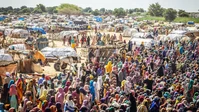 Text behind paywall:
Text behind paywall:
Anarchy in Sudan has spawned the world's worst famine in 40 years
Millions are likely to perish
IT IS OFFICIAL: for only the third time in the past 20 years, the UN has declared a full-blown famine. The declaration concerns a refugee camp called Zamzam, on the outskirts of the city of el-Fasher in Sudan. As long ago as April, Médecins Sans Frontières, a charity, estimated that every two hours a child in the camp was dying from starvation or disease—and since then the situation has got worse.
But it is not just Zamzam that is suffering a horrifying catastrophe. The camp has been singled out solely because it is one of the few places in war-torn Sudan about which the UN has reliable information. In fact, famine is consuming much of the country (see map). It is almost certain to be as bad as, or worse than, the one that afflicted Ethiopia in the 1980s. If much more help does not arrive very soon, it may prove the worst anywhere in the world since millions starved to death during China's Great Leap Forward in the late 1950s and early 1960s.
In May the Clingendael Institute, a Dutch think-tank, released a report which estimated that hunger and related diseases would kill more than 2m people in Sudan by the end of the year. Timmo Gaasbeek, the report's author, has since extended his projections to cover the next two years. In an "optimistic scenario", in which fighting stops and this year's harvest, expected in October, is slightly better than the last, he predicts around 6m "excess deaths" by 2027. In the (more likely) scenario in which fighting continues until early next year, more than 10m may perish. Although some experts have lower estimates, there is an emerging consensus that without decisive action Sudan faces mass starvation on a scale not seen in decades.
Rapid collapse
The cause of the famine is Sudan's civil war, which began in April 2023, when the army and an auxiliary paramilitary, the Rapid Support Forces (RSF), fell out. The ensuing conflict has a strong claim to be the biggest and most destructive in the world today. Perhaps 150,000 people have been killed by the fighting itself. At least 245 towns or villages have been burnt. Much of Khartoum, the capital, has been flattened. More than 20% of the country's pre-war population of roughly 50m have been forced to flee their homes. Some have taken refuge in neighbouring countries such as Egypt, but the vast majority of the displaced—nearly 8m—remain inside Sudan, many of them in camps like Zamzam. Médecins Sans Frontières estimates that 80% of health facilities in war-torn areas are so ravaged by bullets and bombs that they are no longer functional. "Our country is being destroyed by the hour," says Burai Sidig Ali, the governor of the central bank, which itself has been pillaged and torched.
At first, fighting was largely confined to Khartoum and Darfur, a region the size of Spain where the RSF has resumed a campaign of ethnic cleansing against black African ethnic groups first initiated by Arab militias 20 years ago. But the conflict has evolved, in the words of Tom Perriello, America's special envoy to Sudan, into "five or six different wars at the same time".
Both sides encompass an increasingly complex constellation of armed factions. The regular Sudanese Armed Forces (SAF) have enlisted both Islamist militias and voluntary civilian defence units. Foreign mercenaries and Arab tribal militias work with the RSF, itself best understood as a sprawling network of business interests underwritten by plunder. Though it is the more decentralised of the two sides, neither has complete control over its forces. Both block aid and terrorise civilians.
Three times a refugee
One victim of the spiralling violence is Husna Abdul Qader, a mother of five who has been forced to relocate three times in 16 months. She fled Khartoum when the RSF and the army first came to blows, narrowly escaping a volley of bullets aimed at the bus driving her out of the city. Drone strikes in the eastern town of Gedaref, where she spent much of the past year, then pushed her south to Sennar, her family's home state. Then, in early July, RSF fighters tore through her village on motorbikes, prompting Ms Abdul Qader to move again. She arrived two weeks later in Port Sudan on the Red Sea, carrying nothing but her slippers. All her other possessions had been either abandoned or stolen.
An astonishing number of Sudanese have stories like that. Early expectations that the war would come to a quick conclusion, either on the battlefield or through negotiations, have been dashed. Other countries have become involved. Efforts to broker peace have failed. The army refused even to attend peace talks held this month in Switzerland.
In Darfur the RSF and its local allies have crushed the SAF, besieged towns and expelled non-Arabs. Their goal, says Yacob Mohammed, a traditional leader of the Masalit people, who were ethnically cleansed from the city of el-Geneina in Darfur last year, is "land, money and power". The RSF hopes to wrest control of Sudan's western frontier from Libya in the north-west to South Sudan in the south. Doing so would secure it critical supplies of arms, fuel and mercenaries from its allies and business partners in the wider Sahel region.
The only big city in Darfur still outside the RSF's control is el-Fasher. But with the RSF dug in around the city and nearby camps, including Zamzam, hundreds of thousands of civilians are being slowly "strangulated", says Nathaniel Raymond of Yale University. More than a million may have fled. Satellites reveal swelling cemeteries.
In Khartoum the battle lines have been relatively static for months. Despite some gains by the SAF earlier this year, most of the city centre remains under the RSF. The army's leaders and remnants of the civil authorities have decamped to Port Sudan, where they have established a sort of government-in-exile. The generals insist the move is temporary. "We are not going to stop until we control the whole country," says General Ibrahim Jaber, a member of the "sovereign council" that administers the areas the SAF controls. But the SAF has nonetheless begun renovating a British colonial mansion in Port Sudan to serve as the council's headquarters.
Most alarming is the RSF's south-eastward advance. Unpublished satellite imagery shows trucks in Sennar state dumping objects "the size of bodies" into the Nile, says Mr Raymond. More than 700,000 people have fled the region, including Ms Abdul Qader. Many, including her oldest son, have arrived in the eastern state of Gedaref, which is also home to tens of thousands of refugees from Ethiopia. Conditions in the makeshift camps they have built are "deplorable", says Abdirahman Ali of CARE, another charity. Clean water and medical care are desperately scarce. The rainy season is helping to spread cholera and other diseases, which are especially dangerous to those weakened by hunger.
Military analysts think the RSF aims to fight its way to the Ethiopian border to open up a new supply line. It may then turn northwards, either to Port Sudan or to the SAF's remaining toeholds in Sennar, White Nile and Gezira states. These are productive agricultural zones; the threat of more fighting in such places is one reason why Mr Gaasbeek thinks famine will blight an even greater area next year.
The ever-shifting battlefield is also impeding the flow of humanitarian aid. Eddie Rowes, the head in Sudan of the World Food Programme, a UN agency, says it delivered more than 200,000 tonnes of food between April 2023 and July 2024, far less than is needed. Some of the shortage is down to theft and damage by the RSF and other militias. But much blame lies also with the SAF, which is loth to allow food into areas, including most of Darfur, under the control of the RSF.
A single convoy of aid trucks can wait six weeks or more in Port Sudan to be cleared by the SAF for onward travel. Even then, almost all of it goes to SAF-controlled areas. Only a tiny fraction has reached Darfur. On August 15th the SAF agreed to allow aid agencies to resume shipments via a crucial border post controlled by the RSF between Chad and Darfur. That should help, but the army continues to drag its feet with the necessary paperwork. By spurning peace talks and impeding aid, the two sides are sentencing millions of Sudanese to death.








 and that Millions will die
and that Millions will die 









Jump in the discussion.
No email address required.
Snapshots:
https://www.economist.com/briefing/2024/08/29/anarchy-in-sudan-has-spawned-the-worlds-worst-famine-in-40-years:
ghostarchive.org
archive.org
archive.ph (click to archive)
Jump in the discussion.
No email address required.
More options
Context
an astonishingly good written piece summary of the situation.
!africans
Jump in the discussion.
No email address required.
More options
Context
Jump in the discussion.
No email address required.
More options
Context
Imo let Germany take care of them.
Jump in the discussion.
No email address required.
More options
Context
I hope we import them all to the West, we can't just let them die.
Jump in the discussion.
No email address required.
Someone posted about this on /r/anime_titties and the reaction was "we don't care let them all die". just appointed a PM who had called for a moratorium on immigration to the EU.
just appointed a PM who had called for a moratorium on immigration to the EU.
Jump in the discussion.
No email address required.
More options
Context
More options
Context
Can I blame muslims for this, b-word?
Jump in the discussion.
No email address required.
It's due to socio-economic factors I'm afraid
Jump in the discussion.
No email address required.
Dammit
Jump in the discussion.
No email address required.
More options
Context
More options
Context
More options
Context
I read the whole article but I didn't see how white people are to blame. Can anyone explain how they are beyond 'colonialism'?
Jump in the discussion.
No email address required.
More options
Context
Look all these available soldiers for Russia, motherlover! I hope they can all immigrate to Russia and fight for Putin and die in the fricking mud in Donbass
Jump in the discussion.
No email address required.
More options
Context
They should migrate to Egypt and steal Aevann's job
Jump in the discussion.
No email address required.
they are lol https://www.google.com/search?q=sudan+migration+to+egypt
Jump in the discussion.
No email address required.
The Nubians have returned @HOTEP discuss
@HOTEP discuss
Jump in the discussion.
No email address required.
we are so back
Jump in the discussion.
No email address required.
More options
Context
More options
Context
More options
Context
More options
Context